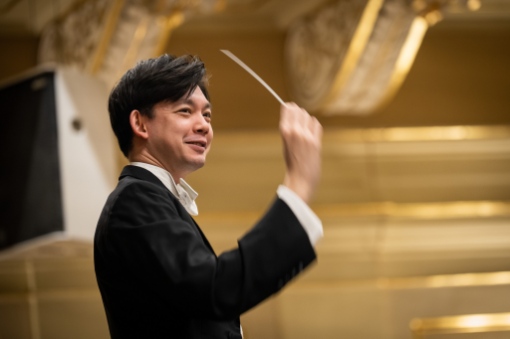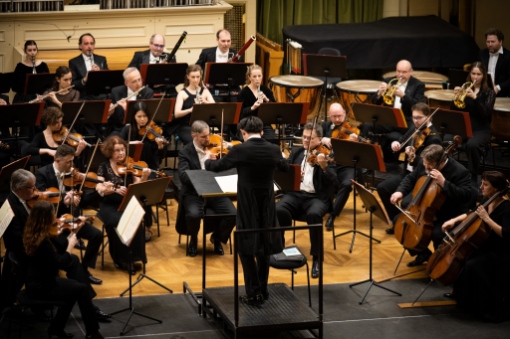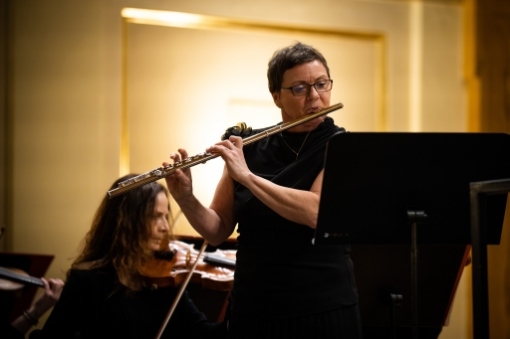For the fourth subscription concert of the Philharmonic at Home series, which took place on 14 March at the Besední dům and was entitled Mozartiana, the Brno Philharmonic, this time under the direction of Czech-Japanese conductor Chuhei Iwasaki, chose four works from the 18th to 20th centuries. These works are dramaturgically linked either directly through their creation in the Classical period or by inspiration from musical practices typical of that period. The first half of the concert featured Martina Venc Matušínská with a solo flute.
Thursday evening opened with Music for Chamber Orchestra by Estonian composer Lepo Sumera (1950-2000). This two-movement composition, in which the first movement is considerably shorter and thus forms a kind of introduction, is inspired by classicism in its overall form in the opening Energico and by the use of pizzicato in the string accompaniment or the birdsong motif for the flute in the following Cantabile. As the title of the first movement implies, the musicians are required to put a lot of energy into their playing, and the orchestra under Iwasaki's direction succeeded admirably. And although the piece was reminiscent of film music, there were a few tricky rhythmic spots that the performers handled without any hesitation. Compared to the first movement, the second required playing with the tone in quieter dynamics to allow the solo flute to stand out. This did not fully emerge as a solo until the second movement (in the first it was more a part of the ensemble) and was not technically demanding, except for the sudden alternation of widely spaced notes. This made very high demands on the quality of tone, yet did not cause any problems for Martina Venc Matušínská. The "endless" cantabile melody was able to emerge fully thanks to its soft velvety tone.

In contrast to the first composition, the Flute Concerto in D Major by Josef Mysliveček (1737-1781) demanded absolutely perfect technique from the soloist. In the first movement, before the solo cadenza, this fell slightly behind the orchestra during the fast run, something that was repeated in the final movement. However, these were always only short sections and harmony was restored in only a few notes. The cadenza itself was technically perfect, with only a few notes at the beginning rustling slightly. Despite these criticisms, Martina Venc Matušínská handled the solo part well, especially considering its difficulty. The Brno Philharmonic under the baton of Chuhei Iwasaki performed as in the first piece of the evening. The conductor used expressive gestures to draw out important instrumental groups for certain moments, and the excellent interplay of the ensemble was certainly helped by very careful indication of the entrances. To this was added fantastic work with dynamics and a strong crescendo even on the short surface rhythms.
Performing celebrated works is always a great challenge for an orchestra. All the more so when the work is as well known as the overture to Wolfgang Amadeus Mozart's opera Don Giovanni (1756-1791). However, the Brno Philharmonic performed this overture with aplomb. The musicians played cleanly, were in sync, and were able to perfectly capture the expressive and dynamic jumps. The last composition, Suite No. 4 in G Major "Mozartiana" by Pyotr Ilyich Tchaikovsky (1840-1893), formed a perfect continuation of the previous number. It is in fact four orchestral arrangements, or rather variations on Mozart's piano pieces (except for the third movement, written as an arrangement of a piano transcription of Mozart's motet Ave verum corpus by Franz Liszt), but was also written by Tchaikovsky in 1887 for the 100th anniversary of the première of Don Giovanni.

Everything already mentioned above applies to the performance of this suite. The orchestra played with admirable commitment, superbly capturing the dynamic and mood differences, perfectly in tune and well coordinated, and only in one ritardando in the fourth movement did it take a while for the orchestra to come completely together as a whole. Moreover, the last part in particular was characterized by technically demanding sections performed either by individuals or entire instrumental groups. Yet all these parts were performed brilliantly and the clarinettist in particular deserves praise. The first violinist was given the most space and had to deal with several difficult runs (this solo passage was also slightly unusual for an orchestral piece due to its length), which - except for the last rapid ascent - she played masterfully.
Despite these shortcomings, the Brno Philharmonic had prepared an interesting programme for the audience, especially for lovers of classical music, and supplemented it with good performances. The conductor, Chuhei Iwasaki, certainly made a great contribution to this, leading the orchestra with very expressive yet absolutely precise gestures. This helped the musicians find the great energy they needed to apply to their performances. Martina Venc Matušínská's solo performance was also of an extremely high standard despite a few minor errors.
Programme:
Lepo Sumera: Music for Chamber Orchestra
Josef Mysliveček: Flute Concerto in D Major
Wolfgang Amadeus Mozart: Don Giovanni - overture
Pyotr Ilyich Tchaikovsky: Suite No. 4 in G Major "Mozartiana"
Martina Venc Matušínská - flute
Brno Philharmonic
Chuhei Iwasaki - conductor
Thursday 14 March 2024 at 19:00, Besední dům
































No comment added yet..